

People love to hate do-gooders, especially at work. Psychological Dynamics of Intractable Conflicts. ByDaniel Bar-Tal Originally Published September 2004; Current Implications added by Heidi Burgess in July 2017.
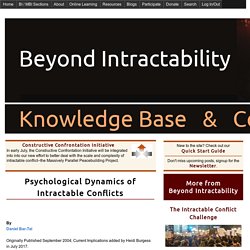
Current Implications This article and the three that follow form a set contributed by Dan Bar-Tal, an Israeli and a leading scholar of the social-psychological causes and impacts of intractable conflict. They provide yet another take on the importance of psychology and emotions in difficult and intractable conflicts that supplements the ideas presented so far in the Conflict Fundamentals Seminar.More... Introduction The present millennium began with dangerous conflicts raging in various parts of the globe.
Volume 20, No. 2 (Summer 2018) - In with the Out Crowd: Contrarians, Alone and Together - The Hedgehog Review: Vol. 20 No. 2 (Summer 2018) Hail Satan!”
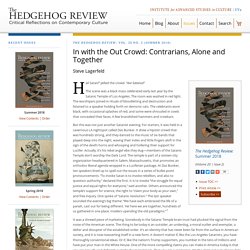
Yelled the crowd. “Ave Satanus!” The scene was a black mass celebrated early last year by the Satanic Temple of Los Angeles. The room was washed in red light. The Selfish Nature of Human Cooperation. An optimistic anthropological perspective on human nature has emerged in the last two decades: the view that cooperation is the most essential human activity and that conflict, violence, and moral evil only recently developed in human history as a result of the emergence of agriculture over the past several thousand years.
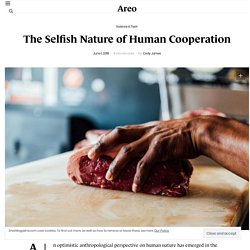
This position is not entirely unfounded, but its advocates often move beyond offering an interpretation of human behavior, ultimately ignoring crucial facts about the essential nature of human intentions for the sake of building their optimistic narrative. Why Good People Turn Bad Online. Meet the scientists finding out how we can defeat our inner trolls and build more cooperative digital societies.

On the evening of 17 February 2018, Professor Mary Beard posted on Twitter a photograph of herself crying. How 10,000 Years of War Made Humans the Greatest Cooperators on Earth. Why collective narcissists are so politically volatile. One Earth, Two Social Fields. Overcoming Us vs. Them. A New Theory That Explains Economic Individualism and Collectivism. By Daniel Hruschka The life of Ferdinand Tonnies, German sociologist and political activist, is a testament to the dramatic social changes which swept across Europe in the 19th and 20th centuries.
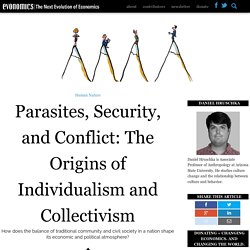
Born in 1855 to a wealthy farmer at the northern fringe of the German empire, Tonnies spent his childhood working on the family estate, sharing close quarters with parents, siblings, and servants, and living in a traditional, face-to-face community of neighbors and extended family. But late in his childhood, young Tonnies’ life transformed when his father uprooted his family to the bustling market town of Husum in a career shift from farming to banking. How Computers Do Genocide. From an office at Carnegie Mellon, my colleague John Miller and I had evolved a computer program with a taste for genocide.

Game Theory Explains How Cooperation Evolved. When the manuscript crossed his desk, Joshua Plotkin, a theoretical biologist at the University of Pennsylvania, was immediately intrigued.
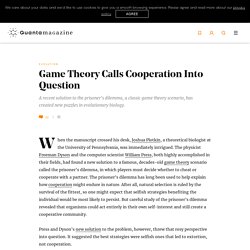
The physicist Freeman Dyson and the computer scientist William Press, both highly accomplished in their fields, had found a new solution to a famous, decades-old game theory scenario called the prisoner’s dilemma, in which players must decide whether to cheat or cooperate with a partner. The prisoner’s dilemma has long been used to help explain how cooperation might endure in nature. After all, natural selection is ruled by the survival of the fittest, so one might expect that selfish strategies benefiting the individual would be most likely to persist. But careful study of the prisoner’s dilemma revealed that organisms could act entirely in their own self-interest and still create a cooperative community.
How Corrupt Societies Corrupt the Behavior of their Citizens - The Atlantic. In February 2014, the European Union published its first ever anti-corruption report.

Over 41 pages, it concluded that bribery, tax evasion, cronyism, embezzlement, political fraud, and the like, cost the European economy 120 billion euros a year, just short of the EU’s annual budget. Corruption costs, clearly, but it deprives citizens of more than money. Power Causes Brain Damage - The Atlantic.
But tornadoes, volcanoes, and tsunamis aren’t the only hubris-restraining forces out there.
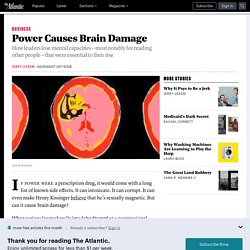
The New Science of Team Chemistry. Executive Summary First used by the U.S.

Army during World War I to try to predict which soldiers would suffer from “shell shock,” personality testing today is a roughly $500 million industry, with an annual growth rate estimated at 10% to 15%. How to Handle Interrupting Colleagues. You’re giving a presentation on the company’s strategic direction when one of your colleagues interrupts you. You pause, address his question, and continue with your point — until he interrupts again. Sound familiar?
Competition, Cooperation, and the Selfish Gene. Richard Dawkins has one of the best-selling books of all time for a serious piece of scientific writing. Often labeled “pop science”, The Selfish Gene pulls together the “gene-centered” view of evolution: It is not really individuals being selected for in the competition for life, but their genes. The individual bodies (phenotypes) are simply carrying out the instructions of the genes. This leads most people to a very “competition focused” view of life. But is that all? More than 100 years before The Selfish Gene, Charles Darwin had famously outlined his Theory of Natural Selection in The Origin of Species. Bruce Schneier: Enabling the Trust That Society Needs to Thrive By. Carol Dweck on Creating a Growth Mindset in the Workplace. The Tragedy of the Commons: How Elinor Ostrom Solved One of Life's Greatest Dilemmas. How disgust made humans cooperate to build civilisations.
The young man was having sex with his dog. Memo to Jeff Bezos: Stack-Ranking is a Destructive Employee Practice. By Alistair Thorpe and Rick O’Gorman Jeff Bezos, CEO and founder of Amazon, recently took some heat when the New York Times exposed working conditions and the corporate culture at his firm. Forbes Welcome. ‘When life hands you a lemon, just bite in’ What Google Learned From Its Quest to Build the Perfect Team. Group Coherence. Agile Connection. Lisa Crispin explains in this article how CI has become an absolute necessity for any software development team in this day and age.
For those who have yet to fully embrace CI, this article gives you some great reasons you should, along with some helpful resources to get you started. In this article, Lisa Crispin recalls a time when testers alone were solely responsible for software quality, and compares that to more modern thinking where collaboration between developers and testers is king. Software quality is everyone's job, sometimes it takes independence to get there. What Mel Brooks Can Teach Us about “Group Flow” A LAYPERSON'S GUIDE TO CO-OPERATIVE INQUIRY. Appreciative Inquiry.
10 Keys to Building Great Teams. Spread the team’s story, prioritise social skills, mix genders, build trust and more… Teamwork is more important than ever. To Understand Religion, Think Football - Issue 17: Big Bangs. The invention of religion is a big bang in human history. Gods and spirits helped explain the unexplainable, and religious belief gave meaning and purpose to people struggling to survive.
But what if everything we thought we knew about religion was wrong? What if belief in the supernatural is window dressing on what really matters—elaborate rituals that foster group cohesion, creating personal bonds that people are willing to die for. How is a group its own worst enemy? - Farnam Street.